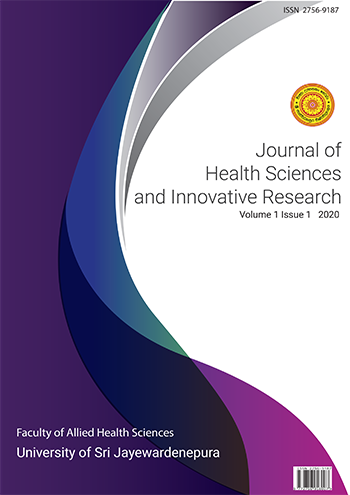A Study on Sample Rejection Rates due to Pre-analytical Errors: Associated Factors and Knowledge, Attitudes and Practices of Nurses on Blood Sample Collection for Haematology at a Teaching Hospital in Sri Lanka
DOI:
https://doi.org/10.31357/jhsir.v1i01.4771Abstract
Introduction: Clinical diagnosis is mostly dependent on laboratory test results. Studies have shown that 70% of clinical laboratory samples are rejected due to pre-analytical errors. This study was conducted to assess; rejection rates of blood samples, major reasons for rejection of blood samples, and knowledge, attitudes and practice of nurses on blood sample collection. Methods: Details of rejected blood samples were collected using data sheets of rejected blood specimens at the Teaching Hospital Karapitiya, Sri Lanka. Knowledge, attitudes and practices of nursing officers on blood sample collection were assessed using a self-administered questionnaire. Data were analyzed using SPSS version 22. Results: Overall blood sample rejection rate was 3.3%. The major cause of rejection of blood samples was the clotting of specimens. Insufficient volume, hemolysis, unavailability of request form for investigation, discrepancies in bed head tickets, discrepancies of the names, and use of IV line for blood collection were among the other reasons for sample rejection. The highest rejection rate was reported from the samples obtained for Prothrombin time/International Normalized Ratio (PT/INR) test. According to the scores obtained for knowledge of the nurses on blood sample collection, 43% of them scored ‘average’ while 38% scored ‘good’. The nurses’ attitudes on blood sample collection were satisfactory. Conclusions: Overall rejection rate was higher in the Haematology Laboratory of Teaching Hospital Karapitiya compared to the values reported elsewhere. Although the overall knowledge of nurses was satisfactory regarding blood sample collection, aspects such as knowledge on the correct volume of blood needed for specific investigations, choosing a suitable site for blood drawing, and practices such as the provision of duly filled investigation forms need to be improved.
Keywords: Rejection rate, Pre-analytical error, Haematology, Blood, Sample collection



